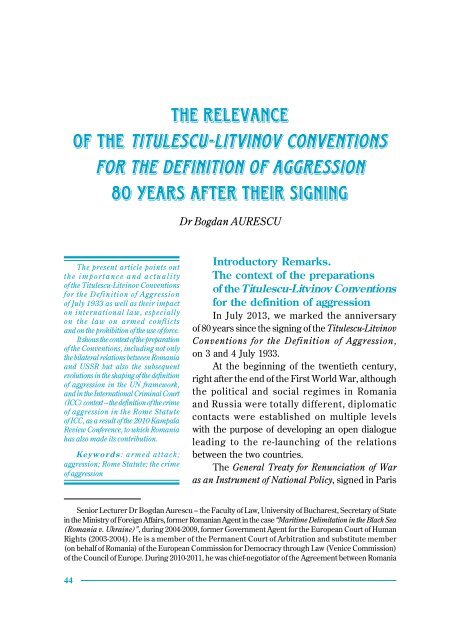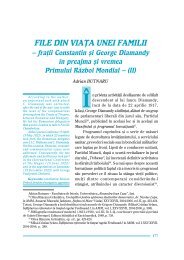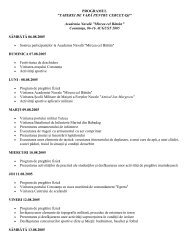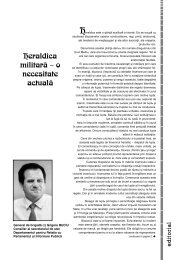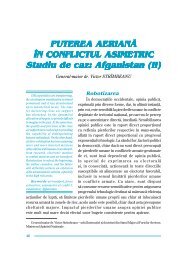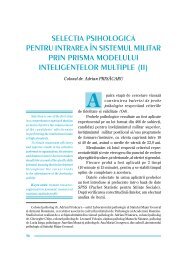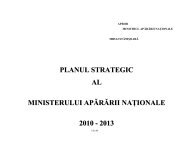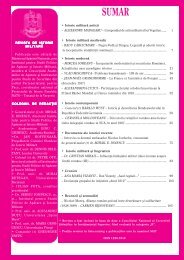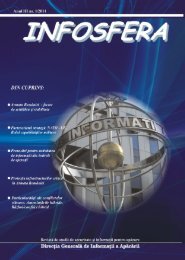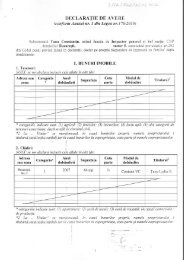the relevance of the titulescu-litvinov conventions for the definition of ...
the relevance of the titulescu-litvinov conventions for the definition of ...
the relevance of the titulescu-litvinov conventions for the definition of ...
Create successful ePaper yourself
Turn your PDF publications into a flip-book with our unique Google optimized e-Paper software.
Romanian Military Thinking ~ 4/2013<br />
THE RELEVANCE<br />
OF THE TITULESCU-LITVINOV CONVENTIONS<br />
FOR THE DEFINITION OF AGGRESSION<br />
80 YEARS AFTER THEIR SIGNING<br />
Dr Bogdan AURESCU<br />
The present article points out<br />
<strong>the</strong> importance and actuality<br />
<strong>of</strong> <strong>the</strong> Titulescu-Litvinov Conventions<br />
<strong>for</strong> <strong>the</strong> Definition <strong>of</strong> Aggression<br />
<strong>of</strong> July 1933 as well as <strong>the</strong>ir impact<br />
on international law, especially<br />
on <strong>the</strong> law on armed conflicts<br />
and on <strong>the</strong> prohibition <strong>of</strong> <strong>the</strong> use <strong>of</strong> <strong>for</strong>ce.<br />
It shows <strong>the</strong> context <strong>of</strong> <strong>the</strong> preparation<br />
<strong>of</strong> <strong>the</strong> Conventions, including not only<br />
<strong>the</strong> bilateral relations between Romania<br />
and USSR but also <strong>the</strong> subsequent<br />
evolutions in <strong>the</strong> shaping <strong>of</strong> <strong>the</strong> <strong>definition</strong><br />
<strong>of</strong> aggression in <strong>the</strong> UN framework,<br />
and in <strong>the</strong> International Criminal Court<br />
(ICC) context – <strong>the</strong> <strong>definition</strong> <strong>of</strong> <strong>the</strong> crime<br />
<strong>of</strong> aggression in <strong>the</strong> Rome Statute<br />
<strong>of</strong> ICC, as a result <strong>of</strong> <strong>the</strong> 2010 Kampala<br />
Review Conference, to which Romania<br />
has also made its contribution.<br />
Keywords: armed attack;<br />
aggression; Rome Statute; <strong>the</strong> crime<br />
<strong>of</strong> aggression<br />
Introductory Remarks.<br />
The context <strong>of</strong> <strong>the</strong> preparations<br />
<strong>of</strong> <strong>the</strong> Titulescu-Litvinov Conventions<br />
<strong>for</strong> <strong>the</strong> <strong>definition</strong> <strong>of</strong> aggression<br />
In July 2013, we marked <strong>the</strong> anniversary<br />
<strong>of</strong> 80 years since <strong>the</strong> signing <strong>of</strong> <strong>the</strong> Titulescu-Litvinov<br />
Conventions <strong>for</strong> <strong>the</strong> Definition <strong>of</strong> Aggression,<br />
on 3 and 4 July 1933.<br />
At <strong>the</strong> beginning <strong>of</strong> <strong>the</strong> twentieth century,<br />
right after <strong>the</strong> end <strong>of</strong> <strong>the</strong> First World War, although<br />
<strong>the</strong> political and social regimes in Romania<br />
and Russia were totally different, diplomatic<br />
contacts were established on multiple levels<br />
with <strong>the</strong> purpose <strong>of</strong> developing an open dialogue<br />
leading to <strong>the</strong> re-launching <strong>of</strong> <strong>the</strong> relations<br />
between <strong>the</strong> two countries.<br />
The General Treaty <strong>for</strong> Renunciation <strong>of</strong> War<br />
as an Instrument <strong>of</strong> National Policy, signed in Paris<br />
Senior Lecturer Dr Bogdan Aurescu – <strong>the</strong> Faculty <strong>of</strong> Law, University <strong>of</strong> Bucharest, Secretary <strong>of</strong> State<br />
in <strong>the</strong> Ministry <strong>of</strong> Foreign Affairs, <strong>for</strong>mer Romanian Agent in <strong>the</strong> case “Maritime Delimitation in <strong>the</strong> Black Sea<br />
(Romania v. Ukraine)”, during 2004-2009, <strong>for</strong>mer Government Agent <strong>for</strong> <strong>the</strong> European Court <strong>of</strong> Human<br />
Rights (2003-2004). He is a member <strong>of</strong> <strong>the</strong> Permanent Court <strong>of</strong> Arbitration and substitute member<br />
(on behalf <strong>of</strong> Romania) <strong>of</strong> <strong>the</strong> European Commission <strong>for</strong> Democracy through Law (Venice Commission)<br />
<strong>of</strong> <strong>the</strong> Council <strong>of</strong> Europe. During 2010-2011, he was chief-negotiator <strong>of</strong> <strong>the</strong> Agreement between Romania<br />
44
Opinions<br />
on 27 August 1928 (<strong>the</strong> famous Briand-Kellogg Pact), although a multilateral<br />
instrument, was to acknowledge <strong>the</strong> opening, at bilateral level, <strong>of</strong> a new stage<br />
in <strong>the</strong> negotiations between Bucure[ti and Moscow, streng<strong>the</strong>ned mainly<br />
by <strong>the</strong> complex activity <strong>of</strong> Nicolae Titulescu and Maxim Maximovich Litvinov,<br />
<strong>the</strong> two Ministers <strong>of</strong> Foreign Affairs, two iconic personalities <strong>of</strong> that era.<br />
Nicolae Titulescu’s ef<strong>for</strong>ts within <strong>the</strong> League <strong>of</strong> Nations, where he served<br />
twice as President <strong>of</strong> <strong>the</strong> Assembly, were directed towards consolidating peace,<br />
maintaining stability <strong>of</strong> <strong>the</strong> post-war relations and building friendly relations.<br />
According to historic accounts, Maxim Litvinov was a cosmopolitan spirit<br />
and a supporter <strong>of</strong> collective security. He worked hard towards tightening relations<br />
with France, Britain and <strong>the</strong> US, and facilitated <strong>the</strong> accession <strong>of</strong> <strong>the</strong> USSR<br />
to <strong>the</strong> League <strong>of</strong> Nations. In this context, <strong>the</strong> ef<strong>for</strong>ts <strong>of</strong> <strong>the</strong> two diplomats happily<br />
converged in <strong>the</strong> negotiations within <strong>the</strong> World Disarmament Conference<br />
that was reconvened in 1933.<br />
The need <strong>for</strong> a <strong>definition</strong> <strong>of</strong> aggression was outlined by Litvinov in early 1933.<br />
In his words: “if we wish to see in action <strong>the</strong> Briand-Kellogg Pact […] we shall have<br />
to give […] instructions <strong>for</strong> its guidance, and that means, first <strong>of</strong> all, defining war<br />
and aggression and <strong>the</strong> distinction between aggression and defence, and once <strong>for</strong> all<br />
condemning those fallacious justifications <strong>of</strong> aggression with which <strong>the</strong> past<br />
has familiarised us” 1 . The Soviet proposal <strong>of</strong> 6 February 1933 contained <strong>the</strong> essence<br />
<strong>of</strong> <strong>the</strong> <strong>definition</strong>, focusing, however, on <strong>the</strong> aggressor. Fur<strong>the</strong>rmore, <strong>the</strong> “Politis Report”<br />
<strong>of</strong> 24 May 1933 proposed that <strong>the</strong> <strong>definition</strong> be part <strong>of</strong> a General Convention<br />
<strong>for</strong> <strong>the</strong> Reduction <strong>of</strong> Armaments 2 . As <strong>the</strong> atmosphere <strong>of</strong> <strong>the</strong> Geneva Conference<br />
on Disarmaments was one <strong>of</strong> mistrust and confusion, Romania and <strong>the</strong> USSR<br />
joined ef<strong>for</strong>ts to make use <strong>of</strong> <strong>the</strong> <strong>definition</strong> <strong>of</strong> aggression in order to rein<strong>for</strong>ce<br />
regional security. These ef<strong>for</strong>ts led to <strong>the</strong> London Conventions, which made express<br />
reference to <strong>the</strong> “Politis Report” and to <strong>the</strong> Soviet proposal.<br />
and <strong>the</strong> United States <strong>of</strong> America on <strong>the</strong> deployment <strong>of</strong> <strong>the</strong> US missile defence system in Romania,<br />
signed in Washington, on 13 September 2011, and <strong>of</strong> <strong>the</strong> Joint Declaration on Strategic Partnership<br />
<strong>for</strong> <strong>the</strong> 21 st Century, adopted on <strong>the</strong> same day.<br />
1<br />
See Benjamin B. Ferencz, Defining International Aggression. The Search <strong>of</strong> World Peace. Part One,<br />
A Documentary History and Analysis, vol. 1, http://www.derechos.org/peace/dia/doc/bf1.html#120<br />
2<br />
Report <strong>of</strong> <strong>the</strong> Committee on Security Questions (Rapporteur: M.N. Politis), League <strong>of</strong> Nations Conference<br />
<strong>for</strong> <strong>the</strong> Reduction and Limitation <strong>of</strong> Armaments General Commission, Conf.D./C.G./108, Conf.D./C.P./<br />
C.R.S./9(1), Geneva, 24 May 1933, http://www.derechos.org/peace/dia/doc/dia17.html<br />
45
Romanian Military Thinking ~ 4/2013<br />
Presentation and implications<br />
<strong>of</strong> <strong>the</strong> Titulescu-Litvinov Conventions<br />
<strong>for</strong> <strong>the</strong> Definition <strong>of</strong> Aggression<br />
The two Conventions <strong>for</strong> <strong>the</strong> Definition <strong>of</strong> Aggression or <strong>the</strong> Titulescu-Litvinov<br />
Conventions established <strong>the</strong> basis <strong>of</strong> what went on to be a widely accepted <strong>definition</strong><br />
<strong>of</strong> aggression and a fundamental landmark <strong>for</strong> <strong>the</strong> practice <strong>of</strong> states in shaping<br />
international law. The first Convention was signed by Afghanistan, Estonia, Latvia,<br />
Persia, Poland, Romania, <strong>the</strong> Soviet Union and Turkey on 3 July, being open<br />
to states “immediately adjacent” to <strong>the</strong> Soviet Union, according to its Protocol<br />
<strong>of</strong> Signature, and <strong>the</strong> second was signed by Czechoslovakia, Romania, <strong>the</strong> Soviet<br />
Union, Turkey and Yugoslavia, on 4 July, being open to all states. Finland acceded<br />
to <strong>the</strong> first convention on 31 January 1934 3 .<br />
In <strong>the</strong> very words <strong>of</strong> Titulescu, uttered just after <strong>the</strong> signature <strong>of</strong> <strong>the</strong> Conventions,<br />
“The Treaty we signed today has a considerable importance. In a moment<br />
when due to so many events <strong>the</strong> international situation is so confuse, in this moment,<br />
in a vast region <strong>of</strong> <strong>the</strong> world, and more precisely in one where it is believed that peace<br />
is most seriously threatened, <strong>the</strong> absolute and consistent obligation <strong>of</strong> nonaggression<br />
was established in <strong>the</strong> most harmonious way… If this <strong>for</strong>mula is accepted by an as larger<br />
as possible number <strong>of</strong> states, it will be possible to work <strong>for</strong> consolidating <strong>the</strong> general<br />
peace”. Addressing his words to Maxim Litvinov, Titulescu said: “Let me add that<br />
this treaty has a special significance <strong>for</strong> my country. It represents a first and important<br />
step in <strong>the</strong> way leading to <strong>the</strong> normalisation <strong>of</strong> our relations. … Romania and USSR<br />
are neighbours. … That means that <strong>the</strong>y are compelled to be friends” 4 .<br />
In this European context, on 9 June 1934, <strong>the</strong> public letters exchange<br />
by <strong>the</strong> Foreign Affairs Ministers <strong>of</strong> Romania and <strong>the</strong> USSR, in Geneva,<br />
represented <strong>the</strong> climax <strong>of</strong> all diplomatic ef<strong>for</strong>ts to re-open normal relations<br />
between <strong>the</strong> two countries, thus resuming <strong>the</strong> diplomatic relations presenting<br />
<strong>the</strong> opportunity to deepen and develop <strong>the</strong> Bucure[ti-Moscow relations.<br />
I will refer briefly to <strong>the</strong> importance and legacy <strong>of</strong> <strong>the</strong> Titulescu-Litvinov<br />
Conventions. Essentially, <strong>the</strong> provisions <strong>of</strong> <strong>the</strong> two Conventions are identical,<br />
3<br />
For <strong>the</strong> text <strong>of</strong> <strong>the</strong> Conventions, see Nicolae Titulescu, Politica extern` a României (1937), Funda]ia<br />
European` Titulescu, Editura Enciclopedic`, Bucure[ti, 1994, pp. 402-411.<br />
4<br />
Speech by Nicolae Titulescu on <strong>the</strong> occasion <strong>of</strong> <strong>the</strong> signing <strong>of</strong> <strong>the</strong> Conventions <strong>of</strong> <strong>the</strong> Definition<br />
<strong>of</strong> Aggression, 3 July 1933, <strong>the</strong> Archives <strong>of</strong> <strong>the</strong> Romanian Ministry <strong>of</strong> Foreign Affairs.<br />
46
Opinions<br />
in <strong>the</strong> sense that <strong>the</strong>y define aggression (or armed attack), <strong>the</strong>y assert <strong>the</strong> acceptance<br />
by <strong>the</strong> contracting parties <strong>of</strong> this <strong>definition</strong> and finally <strong>the</strong>y underline <strong>the</strong> commitment<br />
that no political, military, economic or o<strong>the</strong>r considerations may serve as a justification<br />
<strong>for</strong> aggression. These three elements, <strong>definition</strong>, acceptance and commitment<br />
not to act to <strong>the</strong> contrary were <strong>the</strong> core <strong>of</strong> what was <strong>the</strong>n <strong>the</strong> beginning <strong>of</strong> fight<br />
against war and what is now a general rule <strong>of</strong> international law.<br />
The signatories <strong>of</strong> both treaties were also signatories <strong>of</strong> <strong>the</strong> Briand-Kellogg<br />
Pact, which, in its Article 1, condemned <strong>the</strong> “recourse to war <strong>for</strong> <strong>the</strong> solution<br />
<strong>of</strong> international controversies” and renounced war “as an instrument <strong>of</strong> national<br />
policy”. Never<strong>the</strong>less, <strong>the</strong> Briand-Kellogg Pact did not define aggression. Thus,<br />
<strong>the</strong> preamble <strong>of</strong> <strong>the</strong> two Conventions recalled <strong>the</strong> prohibition <strong>of</strong> aggression provided<br />
by <strong>the</strong> Briand-Kellogg Pact and <strong>the</strong> necessity to establish such a <strong>definition</strong><br />
“in <strong>the</strong> interest <strong>of</strong> general peace” and “to ensure to all peoples <strong>the</strong> inviolability<br />
<strong>of</strong> <strong>the</strong> territory <strong>of</strong> <strong>the</strong>ir countries”.<br />
Both treaties based <strong>the</strong>ir <strong>definition</strong> on <strong>the</strong> “Politis Report” <strong>of</strong> <strong>the</strong> Committee<br />
<strong>of</strong> Security Questions submitted on 24 May 1933 to <strong>the</strong> Conference <strong>for</strong> <strong>the</strong> Reduction<br />
and Limitation <strong>of</strong> Armaments, in response to a proposal <strong>of</strong> <strong>the</strong> Soviet delegation 5 .<br />
In short, <strong>the</strong> <strong>conventions</strong> enumerated <strong>the</strong> five cases <strong>of</strong> aggression:<br />
• declaration <strong>of</strong> war upon ano<strong>the</strong>r state;<br />
• invasion by its armed <strong>for</strong>ces <strong>of</strong> <strong>the</strong> territory <strong>of</strong> ano<strong>the</strong>r state;<br />
• attack by its land, naval or air <strong>for</strong>ces on <strong>the</strong> territory, vessels or aircraft<br />
<strong>of</strong> ano<strong>the</strong>r state;<br />
• naval blockade <strong>of</strong> <strong>the</strong> coasts or ports <strong>of</strong> ano<strong>the</strong>r state; and<br />
• <strong>the</strong> case in which a country supported armed bands which set out<br />
from its own territory and invaded that <strong>of</strong> ano<strong>the</strong>r country, or refusal<br />
to take, in its own territory, all <strong>the</strong> measures in its power to deprive<br />
those bands <strong>of</strong> all assistance or protection.<br />
The conclusion <strong>of</strong> <strong>the</strong>se <strong>conventions</strong> was a tangible contribution towards opposing<br />
aggression and working out international legal principles designed to help prevent<br />
aggression. The <strong>definition</strong> <strong>of</strong> aggression comprised in <strong>the</strong> two <strong>conventions</strong><br />
has since been widely used in international law.<br />
5<br />
Report <strong>of</strong> <strong>the</strong> Committee on Security Questions (Rapporteur: M.N. Politis), op. cit.<br />
47
Romanian Military Thinking ~ 4/2013<br />
The follow-up to <strong>the</strong> Conventions<br />
<strong>for</strong> <strong>the</strong> Definition <strong>of</strong> Aggression<br />
The legacy <strong>of</strong> <strong>the</strong> Titulescu-Litvinov Conventions was brought to life<br />
on 14 December 1974, when <strong>the</strong> United Nations General Assembly adopted<br />
Resolution 3314 6 , which defined acts <strong>of</strong> aggression and was subsequently used<br />
to define <strong>the</strong> crime <strong>of</strong> aggression. Acts <strong>of</strong> aggression were defined by <strong>the</strong> Resolution<br />
as armed invasions or attacks, bombardments, blockades, armed violations <strong>of</strong> territory,<br />
permitting o<strong>the</strong>r states to use one’s own territory to perpetrate acts <strong>of</strong> aggression<br />
and <strong>the</strong> employment <strong>of</strong> armed irregulars or mercenaries to carry out acts <strong>of</strong> aggression.<br />
Although somewhat different in approach, <strong>the</strong> <strong>definition</strong>s given in 1933<br />
and in 1974 are fundamentally alike. In fact, it can be argued that it was <strong>the</strong> intention<br />
<strong>of</strong> <strong>the</strong> parties to <strong>the</strong> two <strong>conventions</strong> to provide a basis <strong>for</strong> <strong>the</strong> development<br />
and future acceptance by <strong>the</strong> international community <strong>of</strong> a generally agreed<br />
upon <strong>definition</strong> <strong>of</strong> aggression. In this sense, in <strong>the</strong> preamble <strong>of</strong> both <strong>conventions</strong>,<br />
<strong>the</strong> parties deemed necessary to establish <strong>the</strong> rules defining aggression<br />
between <strong>the</strong>m, and I would like to quote here, “until such time as those rules<br />
shall become universal”.<br />
Thus, Resolution 3314 begins by providing a general meaning <strong>of</strong> aggression,<br />
namely <strong>the</strong> use <strong>of</strong> armed <strong>for</strong>ce by a state against <strong>the</strong> sovereignty, territorial integrity<br />
or political independence <strong>of</strong> ano<strong>the</strong>r state, or in any o<strong>the</strong>r manner inconsistent<br />
with <strong>the</strong> Charter <strong>of</strong> <strong>the</strong> United Nations. Thereafter, <strong>the</strong> Resolution goes on to use<br />
almost identical wording as <strong>the</strong> Titulescu-Litvinov Conventions to emphasise what acts<br />
constitute aggression.<br />
I have mentioned that a somehow different approach can be noted; indeed,<br />
<strong>the</strong> Titulescu-Litvinov Conventions provide not <strong>for</strong> what acts constitute aggression,<br />
such as <strong>the</strong> Resolution does, but <strong>for</strong> what actions committed by a state make<br />
that state an aggressor. (That is why sometimes <strong>the</strong> Titulescu-Litvinov Conventions<br />
are mentioned in <strong>the</strong> legal doctrine as “Conventions <strong>for</strong> <strong>the</strong> Definition <strong>of</strong> <strong>the</strong> Aggressor”).<br />
However, <strong>the</strong> acts and actions, in essence, are <strong>the</strong> same. Invasions <strong>of</strong> territories<br />
<strong>of</strong> o<strong>the</strong>r states are, in both cases, on <strong>the</strong> first place in <strong>the</strong> list <strong>of</strong> <strong>for</strong>ms <strong>of</strong> aggression.<br />
Attacks by land, naval or air <strong>for</strong>ces, as well as blockades <strong>of</strong> <strong>the</strong> coasts or ports<br />
were also incorporated as acts <strong>of</strong> aggression by Resolution 3314.<br />
6<br />
For <strong>the</strong> text <strong>of</strong> Resolution 3314, go to http://www.un.org/ga/search/view_doc.aspsymbol=A/<br />
RES/3314(XXIX).<br />
48
Opinions<br />
One notable difference refers to acts or actions related to armed bands.<br />
While <strong>the</strong> 1933 treaties provide <strong>for</strong> a low threshold in what may constitute aggression<br />
in relation to armed bands, <strong>the</strong> 1974 Resolution raises this threshold and articulates<br />
different conditions, in order <strong>for</strong> an act related to <strong>the</strong>se bands to constitute aggression.<br />
The Greek politician Nikolaos Politis was behind <strong>the</strong> inclusion <strong>of</strong> “support <strong>for</strong> armed<br />
bands” as a <strong>for</strong>m <strong>of</strong> aggression.<br />
Perhaps ano<strong>the</strong>r cornerstone element in <strong>the</strong> <strong>definition</strong> <strong>of</strong> aggression, found<br />
in <strong>the</strong> two Titulescu-Litvinov Conventions, was <strong>the</strong> reference to possible justifications<br />
or considerations when aggression could be lawful or, to be more precise, <strong>the</strong> explicit<br />
reference to <strong>the</strong> fact that <strong>the</strong>re were no justifications or considerations <strong>for</strong> aggression<br />
regardless <strong>of</strong> <strong>the</strong>ir nature, including political, military or economic. These specific<br />
provisions were also included in <strong>the</strong> United Nations General Assembly Resolution.<br />
The Titulescu-Litvinov Conventions can thus be considered as one cornerstone<br />
<strong>of</strong> <strong>the</strong> <strong>definition</strong> <strong>of</strong> aggression in interstate relations. Never<strong>the</strong>less, <strong>the</strong>y also<br />
represented a starting point <strong>for</strong> very important legal developments with respect<br />
to <strong>the</strong> international personal criminal responsibility: <strong>the</strong> international responsibility<br />
<strong>for</strong> <strong>the</strong> crime <strong>of</strong> aggression.<br />
Prohibition <strong>of</strong> aggression has become a value <strong>of</strong> <strong>the</strong> humanity. However,<br />
history has shown that effective tools are needed, firstly, to deter <strong>the</strong> commission<br />
<strong>of</strong> <strong>the</strong> most serious international crimes and, secondly, to fight against <strong>the</strong> impunity<br />
<strong>of</strong> <strong>the</strong>ir perpetrators.<br />
The Titulescu-Litvinov Conventions were a truly determined ef<strong>for</strong>t in an attempt<br />
to prevent <strong>the</strong> replication <strong>of</strong> <strong>the</strong> atrocities <strong>of</strong> <strong>the</strong> First World War. The lack <strong>of</strong> universal<br />
commitment in <strong>the</strong> prohibition <strong>of</strong> aggression generated, inter alia, <strong>the</strong> tragic<br />
historic events <strong>of</strong> <strong>the</strong> Second World War. These events convinced <strong>the</strong> international<br />
community that more ef<strong>for</strong>ts should be invested in <strong>the</strong> fight against aggression,<br />
<strong>the</strong> most serious <strong>of</strong> <strong>the</strong> international crimes, as stated <strong>for</strong> instance by <strong>the</strong> Nurnberg<br />
Tribunal: “to initiate a war <strong>of</strong> aggression, <strong>the</strong>re<strong>for</strong>e, is not only an international<br />
crime; it is <strong>the</strong> supreme international crime differing only from o<strong>the</strong>r war crimes<br />
in that it contains within itself <strong>the</strong> accumulated evil <strong>of</strong> <strong>the</strong> whole” 7 .<br />
The Principles <strong>of</strong> <strong>the</strong> Nurnberg Tribunal, codified by <strong>the</strong> International Law<br />
Commission in 1950 recalled that “Any person who commits an act which constitutes<br />
7<br />
Nurnberg Judgment, 1, Trial <strong>of</strong> <strong>the</strong> Major War Criminals be<strong>for</strong>e <strong>the</strong> International Military Tribunal,<br />
14 November 1945-1 October 1946, p. 186, reprinted in American Journal <strong>of</strong> International Law,<br />
vol. 186, 1947.<br />
49
Romanian Military Thinking ~ 4/2013<br />
a crime under international law is responsible <strong>the</strong>re<strong>for</strong>e and liable to punishment” 8 .<br />
Aggression was <strong>the</strong> first <strong>of</strong> <strong>the</strong> international crimes, being defined as “planning,<br />
preparation, initiation or waging <strong>of</strong> a war <strong>of</strong> aggression or a war in violation<br />
<strong>of</strong> international treaties, agreements or assurances”.<br />
This <strong>definition</strong> <strong>of</strong> <strong>the</strong> crime <strong>of</strong> aggression, in <strong>the</strong> works <strong>of</strong> <strong>the</strong> International<br />
Law Commission, as early as in 1950, draws our attention upon <strong>the</strong> distinctive<br />
feature <strong>of</strong> <strong>the</strong> crime <strong>of</strong> aggression. The words “in violation <strong>of</strong> international treaties,<br />
agreements or assurances” trigger <strong>the</strong> genuine link between <strong>the</strong> crime <strong>of</strong> aggression<br />
and <strong>the</strong> relevant international documents <strong>of</strong> that period: <strong>the</strong> Briand-Kellogg Pact<br />
and <strong>the</strong> Titulescu-Litvinov Conventions. There<strong>for</strong>e, why is <strong>the</strong> crime <strong>of</strong> aggression<br />
so distinctive, in relation to o<strong>the</strong>r international crimes Because, in its case,<br />
individual criminal responsibility cannot be conceived without <strong>the</strong> international<br />
responsibility <strong>of</strong> <strong>the</strong> state. There can be no crime <strong>of</strong> aggression without an act<br />
<strong>of</strong> aggression by a state.<br />
Almost half a century after <strong>the</strong> Nurnberg Principles had to pass until<br />
<strong>the</strong> international community achieved <strong>the</strong> stage <strong>of</strong> establishing a permanent<br />
International Criminal Court. The month <strong>of</strong> July can be considered as “anniversary”<br />
<strong>for</strong> <strong>the</strong> International Criminal Court, as <strong>the</strong> Rome Statute was adopted on 17 July 1998<br />
and entered into <strong>for</strong>ce on 1 July 2002. Romania is proud to have been among<br />
<strong>the</strong> first 60 states depositing <strong>the</strong>ir instrument <strong>of</strong> ratification, and among <strong>the</strong> 10 states<br />
that deposited <strong>the</strong>ir instrument <strong>of</strong> ratification on 11 April 2002, during <strong>the</strong> special<br />
ceremony that enabled <strong>the</strong> entry into <strong>for</strong>ce <strong>of</strong> <strong>the</strong> Statute on 1 July 2002 9 .<br />
From <strong>the</strong> perspective <strong>of</strong> criminalising <strong>the</strong> crime <strong>of</strong> aggression, <strong>the</strong> Rome Statute<br />
was at <strong>the</strong> same time a success and a postponement. As <strong>the</strong> states participating<br />
in <strong>the</strong> Rome diplomatic conference were not able to agree on <strong>the</strong> <strong>definition</strong><br />
<strong>of</strong> <strong>the</strong> crime and on <strong>the</strong> conditions <strong>for</strong> exercising <strong>the</strong> jurisdiction, <strong>the</strong> success<br />
was represented by <strong>the</strong> insertion <strong>of</strong> <strong>the</strong> crime <strong>of</strong> aggression in article 5 paragraph (1),<br />
defining <strong>the</strong> material competence <strong>of</strong> <strong>the</strong> Court. According to <strong>the</strong> second paragraph<br />
<strong>of</strong> <strong>the</strong> same article, <strong>the</strong> jurisdiction <strong>of</strong> <strong>the</strong> Court over <strong>the</strong> crime <strong>of</strong> aggression<br />
shall be exercised once a provision is adopted, defining <strong>the</strong> crime and setting out<br />
<strong>the</strong> conditions under which <strong>the</strong> Court shall exercise jurisdiction with respect<br />
8<br />
Report <strong>of</strong> <strong>the</strong> International Law Commission Covering its Second Session, 5 June-29 July 1950,<br />
Document A/1316, pp. 11-14.<br />
9<br />
Bogdan Aurescu, Sistemul Jurisdic]iilor Interna]ionale, 2 nd edition, revised and updated, Editura<br />
CH Beck, Bucure[ti, 2013, p. 167.<br />
50
Opinions<br />
to this crime, on condition that such a provision shall be consistent with <strong>the</strong> Charter<br />
<strong>of</strong> <strong>the</strong> United Nations.<br />
Once a placeholder <strong>for</strong> <strong>the</strong> crime <strong>of</strong> aggression was reserved in <strong>the</strong> Rome<br />
Statute, <strong>the</strong> Final Act <strong>of</strong> <strong>the</strong> Conference directed <strong>the</strong> Court’s Preparatory Commission<br />
to submit “proposals <strong>for</strong> a provision on aggression, including <strong>the</strong> <strong>definition</strong> and Elements<br />
<strong>of</strong> Crimes <strong>of</strong> Aggression and conditions under which <strong>the</strong> ICC shall exercise its jurisdiction<br />
with regard to this crime”.<br />
This was <strong>the</strong> starting point <strong>of</strong> <strong>the</strong> activity <strong>of</strong> <strong>the</strong> Special Working Group<br />
on <strong>the</strong> Crime <strong>of</strong> Aggression, commonly known also as <strong>the</strong> “Princeton Process”<br />
– a process that can be truly considered as a catalyst that brought <strong>the</strong> <strong>definition</strong><br />
<strong>of</strong> aggression to <strong>the</strong> centre <strong>of</strong> <strong>the</strong> international debate. Even if its activity<br />
started <strong>for</strong>mally in 2003, debates began right after <strong>the</strong> Rome Conference,<br />
within <strong>the</strong> Preparatory Committee. Romania made its contribution to this debate<br />
by submitting, toge<strong>the</strong>r with New Zealand and Bosnia and Herzegovina, a proposal<br />
on <strong>the</strong> <strong>definition</strong> <strong>of</strong> aggression, which, <strong>for</strong> <strong>the</strong> first time, separated <strong>the</strong> substantive<br />
part <strong>of</strong> <strong>the</strong> <strong>definition</strong> from <strong>the</strong> procedural one. Mention should be made<br />
that this approach was maintained by <strong>the</strong> ongoing negotiations that ended in 2009,<br />
shortly be<strong>for</strong>e <strong>the</strong> 2010 Kampala Conference that adopted <strong>the</strong> amendments<br />
to <strong>the</strong> Rome Statute and it was <strong>the</strong> basis <strong>for</strong> <strong>the</strong> separation between article 8 bis<br />
– <strong>the</strong> substantial part <strong>of</strong> <strong>the</strong> <strong>definition</strong> – and articles 15 bis and ter concerning<br />
<strong>the</strong> procedural aspects 10 .<br />
In essence, article 8 bis <strong>of</strong> <strong>the</strong> Rome Statute is unavoidably rooted in <strong>the</strong> concept<br />
<strong>of</strong> <strong>the</strong> Titulescu-Litvinov Conventions, which was fur<strong>the</strong>r developed by <strong>the</strong> Definition<br />
<strong>of</strong> Aggression in <strong>the</strong> United Nations General Assembly Resolution no. 3314 (XXIX)<br />
<strong>of</strong> 1974. In fact, that article quotes <strong>the</strong> <strong>definition</strong> <strong>of</strong> aggression in <strong>the</strong> UNGA Resolution,<br />
and builds upon it <strong>the</strong> individual responsibility <strong>for</strong> <strong>the</strong> crime <strong>of</strong> aggression.<br />
From <strong>the</strong> substantial point <strong>of</strong> view, <strong>the</strong> essence <strong>of</strong> <strong>the</strong> Titulescu-Litvinov<br />
Conventions, which is transposed over time in article 8 bis <strong>of</strong> <strong>the</strong> Kampala Amendments,<br />
can be summarised as follows: <strong>the</strong> principle <strong>of</strong> anteriority <strong>of</strong> an aggression, followed<br />
by a non-exhaustive enumeration <strong>of</strong> acts that may represent aggression.<br />
It is well known that <strong>the</strong> Kampala Conference, held between 31 May<br />
and 11 June 2010, achieved an important, yet difficult result. However, it is important<br />
to outline <strong>the</strong> difference between <strong>the</strong> substantial <strong>definition</strong> and <strong>the</strong> procedural<br />
10<br />
Ibid, pp. 168-169.<br />
51
Romanian Military Thinking ~ 4/2013<br />
aspects <strong>of</strong> <strong>the</strong> exercise <strong>of</strong> jurisdiction – and to outline that <strong>the</strong> difficulties concern<br />
only <strong>the</strong> latter. It took <strong>the</strong> international community 77 years to reach <strong>the</strong> Kampala<br />
compromise. And yet some more years are necessary be<strong>for</strong>e <strong>the</strong> International<br />
Criminal Court can exercise <strong>the</strong> jurisdiction over <strong>the</strong> crime <strong>of</strong> aggression and, thus,<br />
sanction <strong>the</strong> commission <strong>of</strong> <strong>the</strong> crime <strong>of</strong> aggression. Romania, as one <strong>of</strong> <strong>the</strong> main<br />
promoters <strong>of</strong> <strong>the</strong> fight against aggression, is determined to speedily ratify<br />
<strong>the</strong> Kampala Amendments, and, thus, to contribute to <strong>the</strong> fulfilment <strong>of</strong> <strong>the</strong> conditions<br />
that must be met in order <strong>for</strong> <strong>the</strong> ICC to exercise <strong>the</strong> jurisdiction over <strong>the</strong> crime<br />
<strong>of</strong> aggression.<br />
*<br />
The legacy <strong>of</strong> <strong>the</strong> great Romanian lawyer and diplomat Nicolae Titulescu<br />
can be found not only in <strong>the</strong> <strong>definition</strong> <strong>of</strong> aggression, which we are invoking<br />
today, but also in <strong>the</strong> idea that <strong>the</strong> strict respect <strong>for</strong> international law is a value<br />
per se, a precondition <strong>for</strong> <strong>the</strong> proper functioning <strong>of</strong> <strong>the</strong> international society.<br />
Today, <strong>for</strong> Romania, compliance with international law, as <strong>the</strong> expression<br />
<strong>of</strong> <strong>the</strong> rule <strong>of</strong> law in international relations, is one <strong>of</strong> <strong>the</strong> core pillars <strong>of</strong> its <strong>for</strong>eign<br />
policy. It is Romania’s firm belief that streng<strong>the</strong>ning <strong>the</strong> rule <strong>of</strong> law should be<br />
a permanent process at both national and international levels.<br />
This vision <strong>of</strong> international rule <strong>of</strong> law was best captured in Nicolae Titulescu’s<br />
words. Allow me to quote <strong>the</strong>se words, a fragment from a speech Titulescu<br />
delivered in 1937 in Bratislava, which are now inscribed next to his effigy<br />
within <strong>the</strong> courtyard <strong>of</strong> <strong>the</strong> Peace Palace in The Hague, <strong>the</strong> headquarters<br />
<strong>of</strong> <strong>the</strong> International Court <strong>of</strong> Justice: “(…) only when law shines like a rising sun<br />
in <strong>the</strong> soul <strong>of</strong> all people, like a guideline, like a categorical imperative, like obedience<br />
being perceived as organised freedom, only <strong>the</strong>n will mankind be saved, because it is<br />
in <strong>the</strong> peace created by legal order that man can fulfil his destiny (…)” 11 .<br />
11<br />
Nicolae Titulescu, Documente diplomatice, Editura Politic`, Bucure[ti, 1967, p. 833.<br />
52


